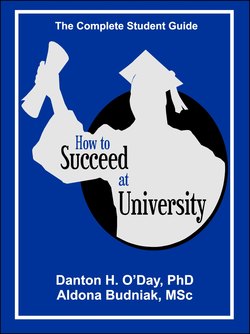Читать книгу How to Succeed At University--International Edition - Danton O'Day - Страница 7
На сайте Литреса книга снята с продажи.
Understand Yourself
ОглавлениеMake the most of yourself for that is all there is of you.
—Ralph Waldo Emerson
At first glance the university can be an awe-inspiring place. You will enter the almost sacrosanct halls of academe as the underling. You have lost your place as one of the upper-year students in high school; you will have to start from the beginning again at university. You are young. As a result you may feel insecure in your new environment. You will be tempted to sacrifice the “me” for the “us”. Don’t do it! Remain unique. If you are not already independent, develop independence. Don’t follow the crowd unless it is clearly to your benefit. Your newfound freedom, the freedom that life at university can give, can lead to your rapid decline if you aren’t enough of an individual to survive.
The biggest problem for students, as for people in general, is to understand yourself. What are your strengths? What are your weaknesses? What are your personal limits? You must learn to build on your strengths and cautiously avoid your weaknesses or, better yet, overcome them. For instance, a surprising number of students enter university with a limited command of written English. If your written English is weak, you can work around your deficiency. Don’t try to write sentences that are beyond you. Don’t get so tangled up in words that your meaning isn’t clear. You should write sentences that are short and to the point. On exams most professors are not expecting fancy displays of terminology; they want you to tell them that you understand and know the material.
Did You Know?
In 2011, only 52% of high school graduates who took the ACT (a higher education admission test in the United States) were capable of reading at the postsecondary level.3
However, you will be assigned reports and essays in which you will be expected to show a reasonable command of the English language. If your English expression is weak, you would be well advised to strengthen it by taking an introductory English class in your first year. Even if you have an extensive vocabulary, you must know your limits. Don’t employ words or terminology that you are not positive about. A simple word that is correct conveys more than a pompous one that is wrong. Using the wrong word may suggest that you don’t know what you’re talking about when in reality you might.
The person who uses a lot of big words is not trying to inform you; he’s trying to impress you.
—Oscar Miller
Now don’t get the wrong impression. We are not advocating adhering to an inadequate vocabulary. We am saying that while developing your vocabulary, you should be careful to remain within the limits of your learning.
There are few mandatory first-year English classes in many universities today. Often high school English requirements are also minimal. In the absence of good training you should use what you do know to your advantage.
If you are not competent in English, you will pay for your incompetence time and time again. In every subject your grades will be lower because you have difficulty expressing your ideas in written words. The cure is a writing workshop (most universities have one), a non-credit class that teaches you how to write essays, book reports, etc. In a writing workshop you will write essays for critical assessment. Your weaknesses will be corrected and your strengths reinforced. If your written communication is weak, take advantage of this facility. Details about the university writing workshop (how it is organized, when it operates, whom to see, etc.) will usually be available in the student services centre, library or similar facilities, in addition to the university website.
This seems the best time to broach a very important aspect of your life. You are a unique, special person. You have to develop your feelings of worthiness. If you find that book learning does not come easily for you no matter how hard you try, don’t feel stupid. Some people can’t learn easily from books; some people do not do well at university. So what? Find out what you are good at and do it. If you discover that you just aren’t interested in succeeding at university, know when to pack it in. Exploit your virtues, not your weaknesses. Don’t waste time trying to get a degree that will be made meaningless by low grades on your academic transcripts.
That said, people who can’t learn from books are in the minority. We firmly believe that anyone with normal intelligence can be a top student at university. That’s what this book is all about.
